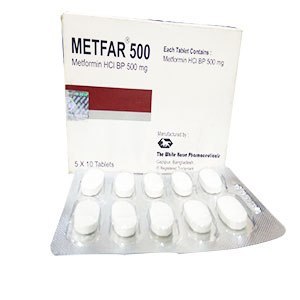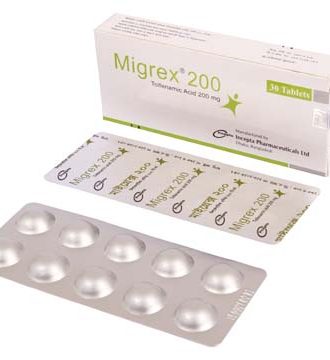Subtotal: ৳ 275.00
Metfar (Tab) 500mg
৳ 4.00
Indications
Metformin Hydrochloride is indicated as an adjunct to diet and exercise to improve glycemic control in patients with type 2 diabetes. Metformin is also indicated for use in combination therapy with an oral hypoglycemic agent or insulin when diet and exercise does not result in adequate glycemic control.
Therapeutic Class
Biguanides
Pharmacology
Metformin is a biguanide type oral antihyperglycemic drug used in the management of type 2 diabetes. It lowers both basal and postprandial plasma glucose. Its mechanism of action is different from those of sulfonylureas and it does not produce hypoglycemia. Metformin decreases hepatic glucose production, decreases intestinal absorption of glucose and improves insulin sensitivity by an increase in peripheral glucose uptake and utilization.
Dosage & Administration
Metformin immediate release tablet: Dosage of Metformin Hydrochloride must be individualized on the basis of both effectiveness and tolerance, while not exceeding the maximum recommended daily doses.
- Adult: The usual starting dose of Metformin is 500 mg twice a day or 850 mg once a day, given with meals. Dosage increases should be made in increments of 500 mg weekly or 850 mg every 2 weeks, up to a total of 2000 mg per day, given in divided doses. For those patients requiring additional glycemic control, Glucomin may be given to a maximum daily dose of 2550 mg per day. Doses above 2000 mg may be better tolerated given three times a day with meals.
- Children: The usual starting dose of Metformin is 500 mg twice a day, given with meals. Dosage increases should be made in increments of 500 mg weekly up to a maximum of 2000 mg per day, given in divided doses.
Metformin extended release tablet: Swallow Metformin XR tablet whole and never crush, cut or chew.
- Adult: The usual starting dose of Metformin XR is 500 mg once daily with the evening meal. Dose should be increased in increments of 500 mg weekly, up to a maximum of 2000 mg once daily with the evening meal, alternatively increased to 1000 mg twice daily taken with meal. Patient receiving Metformin immediate release tablet may be switched to Metformin extended release tablet up to a maximum recommended daily dose.
- Children: Metformin extended release tablet has not been studied in children.
- Renal impaired patient: Do not use Metformin in patients with eGFR below 30 mL/min/1.73 m2. Asses risk/benefit of counting if eGFR falls below 45 mL/min/1.73 m2.
Interaction
Co-administration with Carbonic anhydrase (Topiramate, Zonisamide) may increase risk of lactic acidosis. Drugs (Ranolazine, Dolutegravir, Cimetidine) that reduce Metformin clearance may increase the accumulation of Metformin. Alcohol can potentiate the effect of Metformin on lactate metabolism.
Contraindications
Metformin Hydrochloride is contraindicated in patients with severe renal impairment, hypersensitivity to Metformin, acute or chronic metabolic acidosis and diabetic ketoacidosis, with or without coma.
Side Effects
The most common side effects are diarrhea, nausea, vomiting, flatulence, asthenia, indigestion, abdominal discomfort and headache.
Pregnancy & Lactation
Published studies have not reported a clear association with Metformin and major birth defects, miscarriage, or adverse maternal or fetal outcomes when Metformin was used during pregnancy.
Lactation: Metformin is excreted into human breast milk. No adverse effects were observed in breastfed newborns/infants. However, a decision on whether to discontinue breast-feeding should be made or taking into account the benefit of breast-feeding and the potential risk to adverse effect on the child.
Precautions & Warnings
Metformin Hydrochloride is known to be substantially excreted by the kidney and the risk of Metformin accumulation and lactic acidosis increases with the degree of impairment of renal function. Metformin may lower vitamin B12 level. It also increases risk of hypoglycemia when use in combination with insulin or insulin secretagogue.
Overdose Effects
Hypoglycemia has not been seen with Metformin doses up to 85 gm, although lactic acidosis has occurred in such circumstances. Lactic acidosis is a medical emergency and must be treated in hospital. The most effective method to remove lactate and Metformin is hemodialysis.
Storage Conditions
Keep below 30°C temperature, protected from light & moisture. Keep out of the reach of children.

 Himalaya Men Pimple Clear Neem (Face Wash) 100 ml
Himalaya Men Pimple Clear Neem (Face Wash) 100 ml 




Reviews
There are no reviews yet.